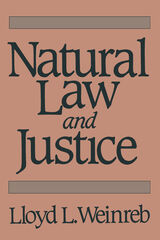
“Human beings are a part of nature and apart from it.” The argument of Natural Law and Justice is that the philosophy of natural law and contemporary theories about the nature of justice are both efforts to make sense of the fundamental paradox of human experience: individual freedom and responsibility in a causally determined universe.
Lloyd Weinreb restores the original understanding of natural law as a philosophy about the place of humankind in nature. He traces the natural law tradition from its origins in Greek speculation through its classic Christian statement by Thomas Aquinas. He goes on to show how the social contract theorists adapted the idea of natural law to provide for political obligation in civil society and how the idea was transformed in Kant’s account of human freedom. He brings the historical narrative down to the present with a discussion of the contemporary debate between natural law and legal positivism, including particularly the natural law theories of Finnis, Richards, and Dworkin.
Weinreb then adopts the approach of modern political philosophy to develop the idea of justice as a union of the distinct ideas of desert and entitlement. He shows liberty and equality to be the political analogues of desert and entitlement and both pairs to be the normative equivalents of freedom and cause. In this part of the book, Weinreb considers the theories of justice of Rawls and Nozick as well as the communitarian theory of Maclntyre and Sandel.
The conclusion brings the debates about natural law and justice together, as parallel efforts to understand the human condition. This original contribution to legal philosophy will be especially appreciated by scholars, teachers, and students in the fields of political philosophy, legal philosophy, and the law generally.

We speak of rights as though they are objective matters of fact that have a crucial bearing on how we ought to behave. Yet few, if any, rights are universally acknowledged without wide differences of meaning. Instead, they usually represent the particular ideals of the individuals or groups that claim them. Theories of rights have always grappled with this central problem, but none of the literature on the subject has offered a satisfactory solution. Lloyd Weinreb makes the first significant advance toward an understanding of what rights are, how they function in our lives, and why we need them.
Weinreb’s central argument is that rights are tightly connected to responsibility. They are the normative constituents of persons, attributes that we have rightly, as our due. As such, they enable us to overcome the antinomy of moral freedom and natural causal order. Without them, we could not regard human beings as persons, that is, as free and responsible, or autonomous. Since responsibility is a structural feature of our experience and a matter of fact, rights too are matters of fact.
Against a review of the current debates on the subject, Weinreb fully elaborates his original argument on the nature of rights and finds the source of concrete rights in the nomos, or deep conventions, of a community. Applying his theory, he shows how it helps to answer specific questions about animal rights, human rights—including, in the context of abortion and capital punishment, the right to life—and civil rights, including particularly rights of the handicapped, gay rights, and affirmative action in contemporary American society. Along the way, Weinreb shows that Oedipus and Roger Clemens have more in common than either would probably have supposed.
This highly original work will significantly redirect the study of rights. It will be especially valuable to those who practice or study law, philosophy, politics, and public policy.
READERS
Browse our collection.
PUBLISHERS
See BiblioVault's publisher services.
STUDENT SERVICES
Files for college accessibility offices.
UChicago Accessibility Resources
home | accessibility | search | about | contact us
BiblioVault ® 2001 - 2024
The University of Chicago Press









